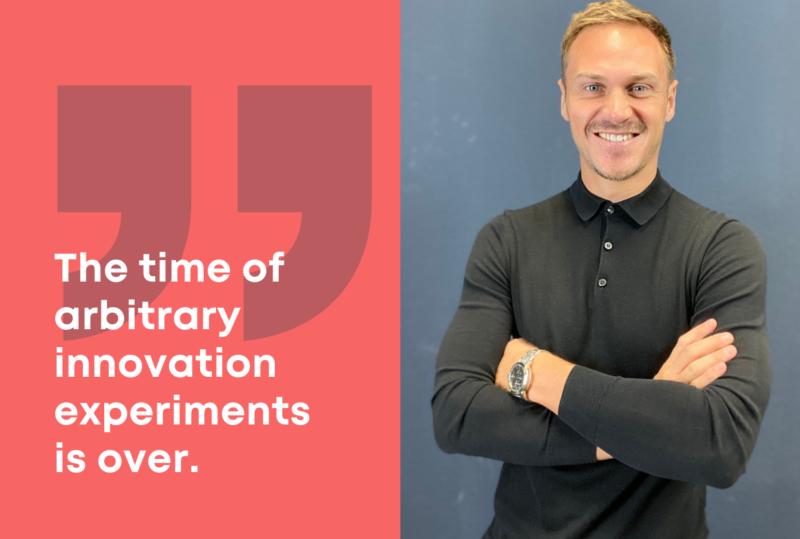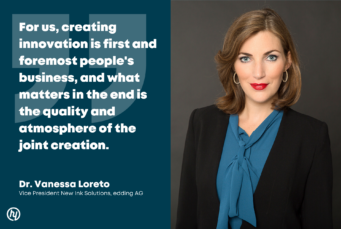3 Questions to Tobias Weber

Tobias Weber is Co-Head of the Payment Innovation Lab SPAYCE of S-Payment GmbH. We talked to him about his goals and challenges and about his perspective on the corporate innovation landscape in Germany.
You’re setting up SPAYCE for Saving Banks (Sparkassen) and LBBW. What are your goals and what are the major challenges in this process?
The starting point for building SPAYCE in collaboration with LBBW was a blank sheet of paper. We analyzed a lot of innovation labs already established to distil the right setting. Our overarching goal was and still is to enable executable payment innovations for our main target group – the Saving Banks (Sparkassen).
I believe that besides all positive impacts an innovation lab can have, execution of an idea and finally implementing the product is the ultimate measure for any innovation unit within a corporate environment, doesn’t matter if it’s an innovation lab, internal innovation unit, intrapreneur program or whatever.
In order to achieve this, we built SPAYCE from the very beginning upon two main pillars:
- Focusing on innovation topics near the core business – at least during the first years – rather than on adjacent or disruptive market segments. First, having this focus makes it easier to show the relevance of the idea in the short term. Secondly, it helps to convince the stakeholders to cross the chasm between the idea development phase and the final implementation, which means investing the “big money” and putting the idea on the product roadmap.
- Following a collaborative approach throughout the entire process of an innovation idea. Working on ideas together with experts from different companies, from inside and outside the Sparkassen Financial Group, helps a lot in order to bring in the necessary expertise. Furthermore, it enables us to establish an early commitment to the idea on an operational level. This consequently fosters the involvement of the necessary players to execute and scale the idea in a later stage.
Due to the fact that we are working operationally on different payment innovations, our goal for the next months is to bring the first ideas to reality. We are on the right track so far and we are really looking forward to it.
Nevertheless, looking towards challenges within the existing corporate environment, implementation and scaling are clearly our main challenges. Scaling an innovation within the whole Sparkassen Financial Group means to convince a lot of stakeholders and decision-makers due to the association’s structure of the group.
Based on the experience so far, our two pillars (focusing on core business innovations and on collaboration), early management involvement and the consideration of given circumstances of the mother company (e.g. long-established processes relevant for the final product launch) really help us to tackle this main challenge. In short, we rather act as enabler, preparer and supporter instead of being a lab separated from everyone.
Overall this makes me feel very positive for the upcoming months.
How do you evaluate the current innovation landscape in Germany and what trends do you expect to see in the next 5 years?
On a corporate level nowadays everyone established innovation labs, intrapreneurship programs, internal innovation units etc. Even among medium-sized companies, we see a high level of coverage. So, in general, there is a huge potential to innovate and digitize.
But, I believe that the time of arbitrary innovation experiments is over. The right balance between “acting as extended workbench” – innovate close to the core business of the mother company – and “being a satellite” – innovate in disruptive market segments – will be even more important due to the impact of COVID-19. The already existing pressure towards feasible innovation ideas and the execution of them will continue and intensify. Bringing the idea to reality and scaling will continue the supreme discipline. Knowing that this requires a disciplined marathon rather than hectic sprints, I’m curious to observe the impact of the current uncertain times on the corporate innovation units on the long term.
Regarding innovation activities in the payment market, I expect that we will see even more competition in the next years and the battle for especially young customers will continue. The ongoing coronavirus pandemic will alter consumer behaviours faster than ever before and accelerate digital solutions (e.g. contact-free payment options) and digital banking in general. Hence, we will see further innovations around established and digitalized core products where big players (banks) will compete with FinTechs and BigTechs. At the same time, I expect that there will be some kind of consolidation especially because of the negative effects of COVID-19 on the economy.
Name 3 things that are essential for your daily work and tell us why.
- Start the day with the intend that “action beats perfection” – Execution and achievement of results foster innovation and progress way more than perfection. Focus on delivering results and iterate continuously.
- Kanban Tool – Most essential tool for our core team to structure the tasks in general as well as the tasks within the teams working on the innovation ideas
- AirPods – Listening to music helps me to be creative and focus on what is needed – of course only when there is no meeting ?
About SPAYCE
SPAYCE is an innovation lab through which S-Payment and LBBW have established an open platform for cross-company cooperation. SPAYCE develops feasible innovations in the payment segment for the German Sparkasse Financial Group. In doing so, SPAYCE develops payment related product ideas in an iterative, customer-centric and resource-saving process together with interdisciplinary teams of experts to provide a value added to the Sparkasse Financial Group.
About Tobias Weber
Tobias is Co-Head of SPAYCE and Business Innovation Manager of S-Payment. His goal is to realize innovative payment products with real benefit for the customer. Before that he worked several years as management consultant with focus on strategic innovation management. Hereby, he helped several DAX companies as well as medium-sized enterprises to realize innovation ideas and implement innovation processes.

